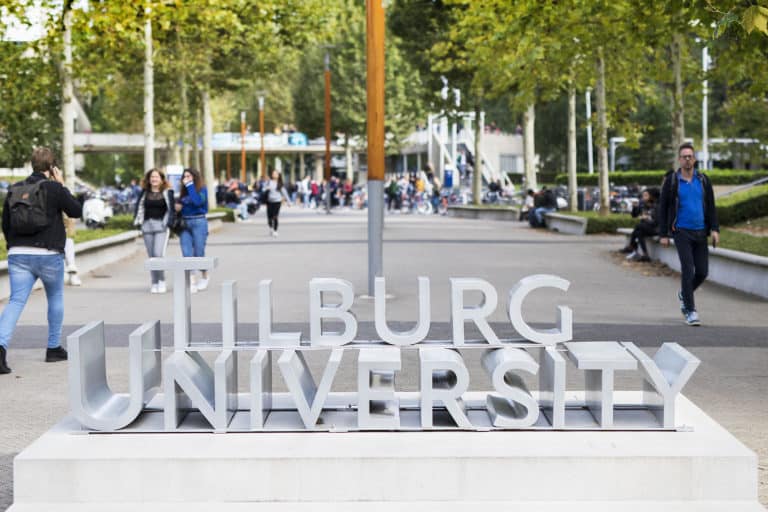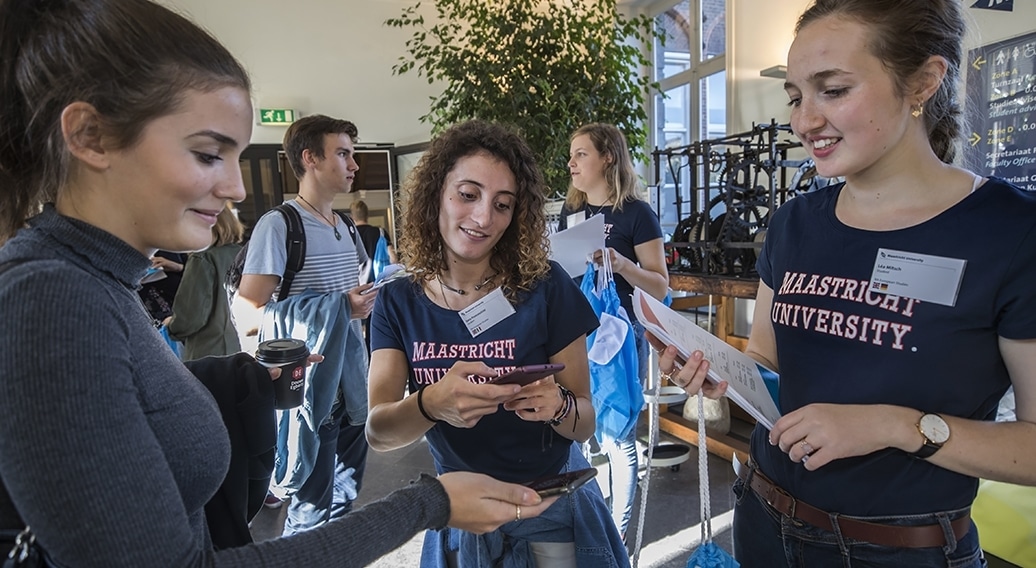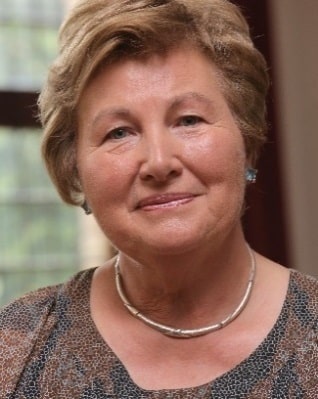Courses in English at Our Universities? Yes, but in Moderation
The increasing anglicization of higher education in the Netherlands and the need for Flemish universities to be less limited in their choice of English are issues that are as controversial as they are topical. Especially in the north, the arguments fly back and forth. Sometimes they are pro, usually against. It is no accident that ‘gone overboard’ seems to be the words most often used when it comes to any discussion of the role of English at universities and colleges.
The discussion has been raging in the Netherlands for more than a decade, and it involves some thorny questions: How can a smaller country hold its own in a globalised world? How can nations use English without allowing it to steamroll over other languages? How can a country remain attractive to researchers who would otherwise just go to the US, Canada or Australia? How can a society maintain Dutch as a language of culture and society in a multicultural context? And above all: What are the lessons learned after more than ten years of extensive anglicization?
How can a society maintain Dutch as a language of culture and society in a multicultural context?
In the early 1990s, it was then Minister of Education Jo Ritzen who blew the whistle. The Berlin Wall had just fallen, and European students were enthusiastically throwing themselves into the Erasmus programme. The buzzwords were mobility and internationalisation. Ritzen proclaimed that thirty percent of all course units at Dutch universities should also, eventually, be offered in English.
No sooner said than done. Ritzen’s proposal was widely supported within the spheres of education and research, and politicians and MPs also got to work. In 2023, three decades later, a third of all Dutch bachelor programmes and more than two-thirds of all master programmes will be taught in English.
‘No country in Europe has focused so pointedly on English as a language of higher education,’ says Godelieve Laureys, Professor Emerita of Linguistics at Ghent University and co-author of the Language Matters report on language use and language policy at the Flemish universities, which will soon be published by the Royal Flemish Academy for Science and Arts. ‘The Netherlands is pre-eminently a mercantile country and universities were unhappy that the worldwide flow of students ignored Europe. They wanted some of that traffic for themselves.’

© Tilburg University
Qualitative success
The main goals envisaged by the policy at the time were to connect the Netherlands more closely to international research, prepare Dutch students in their own country for the global labour market and attract more foreign students.
The third goal has certainly been met: over the past fifteen years, Dutch universities and colleges have almost quadrupled the number of foreign students. In the 2021-22 academic year, the Netherlands had no fewer than one hundred and fifteen thousand “international” enrolments, while about forty percent of all first-year students at universities were not, in fact, Dutch.
About forty percent of all first-year students at Dutch universities are not Dutch
While the majority of the students involved hail from Europe and, in particular, from Germany, just under twenty thousand Asians, primarily from China and India, have also found their way to the Netherlands, followed by students from North and South America, Africa and Oceania.

© Maastricht University / Harry Heuts
The anglicization that has kept pace with these changes now poses a sort of chicken or egg conundrum: The wider the English-language offerings, the more international students will come; the more foreign students enrolled at a university, the faster it will switch to English as the teaching language. At the University of Twente, Dutch has not been the language of instruction for two years now. In Eindhoven, with its Brainport, the course offering has already been completely anglicised and, in Maastricht, things are moving at a similar pace.
‘As a researcher, you simply want the best people on your team,’ says professor Andries de Grip of the School of Business and Economics at Maastricht University. ‘Nationality doesn’t matter. And if you want a job in the economic sector, in a bank or international company, then being educated in English offers real added value. In my domain, all the technical terminology is already in English. This also applies to management, just as it does to the finance, accountancy and HR departments in business. English is pervasive throughout our field.’
 Professor Andries de Grip: 'If you want a job in the economic sector, in a bank or international company, then being educated in English offers real added value.'
Professor Andries de Grip: 'If you want a job in the economic sector, in a bank or international company, then being educated in English offers real added value.'Maastricht, particularly, benefits from its location. Although ‘peripheral to the Netherlands, it is very central to Europe and in the Euregion. When we sit down with our EU-regional project partners from Nordrhein-Westfalen, the provinces of Liège and Limburg and the East Cantons in Belgium, I can assure you that, at our first meeting, each partner speaks their national language. It is a bit difficult, to converse in Dutch, German and French. At the next meeting, conversations will very quickly be in English for the sake of convenience.’
Follow the quality?
Though internationalisation has been a roaring success in terms of quantity, political science student Arthur Wiggers (University of Amsterdam, Hertie School of Governance, Berlin) fears that the promised upsurge in quality at Dutch universities will not necessarily follow. ‘I have informed myself reasonably well,’ he says, ‘and I am still waiting for conclusive evidence that higher education in English offers more benefits to society. In addition, many students and lecturers express themselves only moderately well in English. We see that in workgroups and when asked to write essays in English.’
 Political science student Arthur Wiggers: 'I am still waiting for conclusive evidence that higher education in English offers more benefits to society.'
Political science student Arthur Wiggers: 'I am still waiting for conclusive evidence that higher education in English offers more benefits to society.'Because of this problem, Wiggers, who wrote an opinion piece on the subject for the Dutch daily Het Parool is worried about linguistic impoverishment. Dutch students are no longer learning to express themselves in academic Dutch. Why should Dutch students in the Bachelor of Laws at Erasmus University in Rotterdam have to discuss their work with each other in English? And how does it profit students if the subject of statistics within the Bachelor of Public Administration is only taught in the – so-called – language of Shakespeare? ‘Declining Dutch language skills will have consequences for the labour market,’ Wiggers predicts. ‘Dutch is still essential in professions such as family medicine, judge or notary.’
 Language psychologist Annette de Groot: 'Twenty percent of the first-year students do not know enough Dutch, but one hundred percent of the students appear to be deficient when it comes to academic English.'
Language psychologist Annette de Groot: 'Twenty percent of the first-year students do not know enough Dutch, but one hundred percent of the students appear to be deficient when it comes to academic English.'Wiggers’ conclusion is in line with the opinion of language psychologist Annette de Groot (University of Amsterdam), an active participant in the discussion surrounding anglicization. Academic/scientific language relies on accuracy and nuance, and Dutch students who study in English fall short of that. ‘Twenty percent of the first-year students do not know enough Dutch,’ says De Groot, ‘but one hundred percent of the students appear to be deficient when it comes to academic English. The English vocabulary of the average Dutch-speaking student is at least forty percent less than their vocabulary in Dutch. Studying in a language that a person has not sufficiently mastered is more mentally taxing and makes those studies more difficult.’
Farewell to English?
Still, Godelieve Laureys, referring to the deliberately polemical title of a book on the subject that was published in 2019, and in which De Groot also participated, cautions that the debate about anglicization had better not become a plea Against English!
 Professor Emerita of Linguistics at Ghent University, Godelieve Laureys: 'We must ensure that publications in Dutch are not dismissed as inferior just because they are written in a language other than English.’
Professor Emerita of Linguistics at Ghent University, Godelieve Laureys: 'We must ensure that publications in Dutch are not dismissed as inferior just because they are written in a language other than English.’‘Many arguments put forward by opponents of anglicization do, indeed, make sense, although they sometimes turn out to be overblown. Dutch is under the influence of English because languages are subject to the political and economic conditions of the moment, which is as true today as it always has been,’ says Laureys. ‘But is Dutch threatened by English? No, Dutch remains a robust and codified language that is functionally used in all social contexts and is studied at a high level. This means that our language will not disappear any time soon.’
Arthur Wiggers emphasises that he also doesn’t want to ‘say goodbye to English. By definition, there is no way back, but there is another way forward: why don’t we encourage international students to learn Dutch? Then they have a better chance in the Netherlands and can integrate into the labour market. That can only be to their advantage.’
Wiggers knows what he is talking about. He completed an Erasmus exchange in Paris, and had the pleasure of studying at the Cité Universitaire et Internationale de Paris where he did SciencesPo, largely in French. ‘The Dutch often stereotype the seemingly French obsession with the purity of their language, but I really enjoyed learning French. Everyone helps you, too.’ By the way, and despite French being the language of instruction: ‘In its field, SciencesPo ranks number two worldwide, between Harvard and Oxford!’

© Ghent University
Damaging for society
‘International students simply look for the path of least resistance,’ according to Annette de Groot. ‘The fact that they can study in English means that they no longer make any effort to learn Dutch, or to intermingle with the Dutch, and they mainly befriend their own compatriots. Two decades ago, foreign students did make the effort. That was true multilingualism and real internationalisation, not the provincialism of almost total anglicization.’
‘In this system, the student is exposed to a nearly pure Anglo-Saxon, neoliberal paradigm,’ says Wiggers. ‘In the first year of political science, we talk more about the problem neighbourhoods of Chicago than about the Schilderswijk in The Hague. With anglicization, we suddenly lose our focus on Dutch subjects, which are also of great importance.’
‘It is no longer about the Netherlands,’ agrees De Groot, who has given lectures in English herself. ‘Three quarters of the psychology students in this country now come from abroad and all of them use textbooks written in English.’
Anglicization is particularly detrimental to students with migrant backgrounds coming from Dutch secondary schools
And it is not only the native-Dutch students who are increasingly under pressure at Dutch universities. Anglicization is particularly detrimental to students with migrant backgrounds coming from Dutch secondary schools. They have often put a lot of effort into learning Dutch and have to leave that behind because higher education has become anglicised. The exclusion of Dutch, according to an often-heard argument, not only leads to a kind of half-lingualism but also damages Dutch society. Young people who are not from an educated environment already find it difficult to succeed in tertiary education and anglicization throws up new obstacles.
And yet, in the sometimes virulent war of words concerning anglicization, critics are often accused of being nationalistic, narrow-minded or passé. ‘As soon as you talk about the social side effects, you are assumed to be in the ‘wrong’ political camp,’ De Groot testifies. ‘That’s why hardly anyone sticks their neck out anymore.’
Patronizing policy
In Flanders which, unlike the Netherlands, has historical experience with the emancipatory power of language struggles, anglicization not only started later but has also become less entrenched. Because quotas are set by decree, Flemish universities are only allowed to offer a maximum of six percent of their bachelor’s programmes in English. Thirty-five percent of master’s programmes may be taught in English, provided that the programme in question is also available in Dutch at one of the five main universities. Moreover, in Dutch-taught bachelor’s degrees, a maximum of thirty out of the one hundred and eighty required credits can be obtained in English. At the master’s level, half of the credits can be obtained from classes taught in English.
Too little, complain the Flemish universities. These limitations jeopardise their internationalisation. Many institutions look enviously at the Netherlands.
‘The weak spot in Flemish policy is that it is too quantitative and too patronizing,’ says Godelieve Laureys. ‘It also lumps all courses together. Not every degree programme has the same need for courses with English as the medium of instruction. Due to the tight policy of the Flemish government, the maximum quotas are often not met. Our recommendation is, therefore, to provide more choices regarding English in certain programmes and, at the same time, to focus more on differentiation.
The main message of our report is that this is a win-win situation,’ says Laureys, and the universities should take on the challenge to guarantee the quality of both English and Dutch.’
Godelieve Laureys: 'The weak spot in Flemish policy is that it is too quantitative and too patronizing'
Where scientific research is concerned, however – that other mainstay of university business – ‘the battle has actually already been won,’ Laureys admits. ‘English is absolutely necessary there if researchers hope to reach a wide audience and maintain the university’s position in the rankings. Nevertheless, we must ensure that publications in Dutch and other foreign languages can also qualify as ‘A-list’ publications so that they are not dismissed as inferior just because they are written in a language other than English.’
Undercurrent
Although the discussion about anglicization mainly revolves around higher and university education, that is only part of the story. The trend also continues in the Dutch and Belgian business communities, and in society at large. At least among young people, English is popular. In Flanders, even French as a second language has come under serious pressure, despite being one of the official Belgian languages.
‘Anglicization is simply a burgeoning phenomenon, and conducting policy against a social trend is difficult,’ admits Andries de Grip. ‘The argument that Dutch teachers and students speak poor English or have lost their Dutch, as a result, has also taken on a life of its own.’
‘It’s quite fantastic to hear how fluently and effortlessly students sometimes express themselves in English,’ Laureys agrees. ‘The idea that many speak only basic English is short-sighted. Incidentally, in the Netherlands, the discussion only fully erupted when, following the example of the universities, colleges of applied sciences also began switching to English as the language of instruction. Their target audience was indeed less well prepared for this, and the problems arising from anglicization were more visible there.’
What also irritates opponents in the Netherlands is that the universities are fundamentally dishonest about their setup. Unlike in Belgium, where the government largely guarantees funding, funding for Dutch institutions has become very dependent on the number of registrations from international students.
‘Actually, the promised cosmopolitanism was a false pretence,’ fears Arthur Wiggers. De Groot fiercely claims that ‘the basis of this misery is the totally perverse funding system. And, by the way, until recently, few universities in the Netherlands got their language policy explained, for that matter.’
Controversial
The language psychologist fears that the turning point has not yet been reached, although awareness of the undesirable side effects of the anglicization of education has certainly increased. In any case, public opinion also seems to be ’tilting’ and, more than ever, Dutch universities find they are forced to defend their policies when it comes to anglicization.
The policymakers have also been shaken up a bit. In 2019, for example, the then Minister of Education Ingrid van Engelshoven (D66) passed a law that should have adequately protected Dutch as an educational language. But then the cabinet fell, and the bill was declared “controversial,” i.e. inadmissible, in the House of Representatives. Current minister Robbert Dijkgraaf (D66) has to do the work all over again.
‘The point is: the law doesn’t need to be revised,’ concludes De Groot. ‘We have a law from 1992 that states that a language of instruction other than Dutch is only possible if education demands it. Well, that law just needs to be obeyed. Meanwhile, the number of English-taught programmes will continue to increase every year. If it continues like this, well, to use the Dutch expression, the universities’ “turnips will soon be fully cooked”.’
Whether one is for or against English in higher education, the discussion is as complex as it is unresolved, although some lines of argument are emerging: In Flanders, policy should be given more prominence, while the Netherlands would benefit from a renewed commitment from the government as a regulator. English can certainly be given a place in programmes that have a pre-eminently global or international profile, but Dutch must at least be able to remain the main language in courses with an outflow geared to the Dutch-speaking labour market. In any case, the discussion continues.








